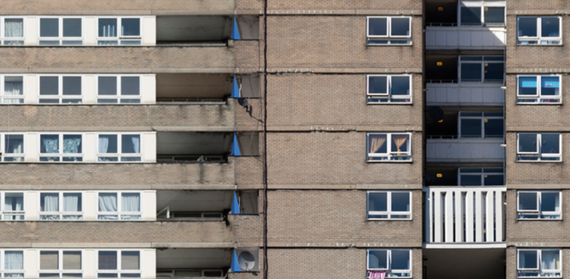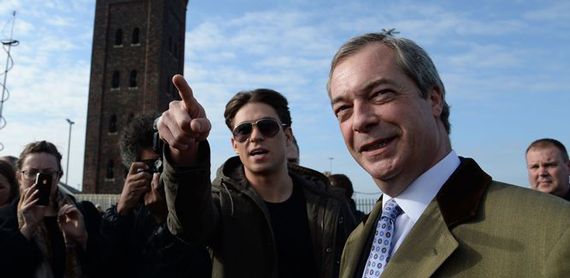Image: Cuddly Little Owl/flickr, CC BY-NC
Guest post by Professor Harris Beider, Centre for Trust, Peace & Social Relations
Once upon a time white working-class people were seen as a political problem. Now they are back in fashion – celebrities such as Adele and David Beckham are proud to talk about their working-class roots and politicians are falling over themselves to win their support. Their votes have also been a key battleground in the Oldham by-election.
Political parties and politicians – albeit for different reasons – are keen to win the support of white working-class communities. This is partly the result of the rise of the right-wing UK Independence Party (UKIP) as a political force – despite only having one seat in the House of Commons, the party managed to secure 3.8m votes – and a disproportionate amount of coverage – in the May 2015 general election.
UKIP’s success was based on exploiting fears that uncontrolled immigration is eroding Britain’s national identity, jobs and public services. The party harvested votes in 2014 and 2015 by creating an impression that open borders and multiculturalism had been imposed on an unsuspecting public by a disconnected and discredited cadre of politicians.
All this plays into the general narrative that white working-class communities are against immigration, multiculturalism and change – and that they whine about a loss of a country and identity that never was, and will not be the reality of modern Britain.
Yet my research, published in a new book, shows the gap between this rhetoric and reality. Based on more than 200 interviews with white working-class urban communities across four areas in three different cities – Aston in Birmingham, Somers Town and Waltham Forest in London and Canley in Coventry – it shows that these groups are not unreconstructed supporters of the extreme right who are opposed to multiculturalism.
Clearly there are some white working class people who vote for UKIP, and may have voted for the far-right British National Party as well – but their voters are found throughout society.
Joey Essex met a number of politicans, including UKIP’s Nigel Farage, in the lead-up to the May 2015 election; ©PA
Diverse and inclusive
I found the people I interviewed had varying views on immigration and multiculturalism. Most – though not all – welcomed difference and diversity and some pointed to the diversity within their own family. This is not surprising because it is white working-class people who are likely to have most contact with migrants in their neighbourhoods, workplaces or schools.
Of course, there have been moments when the white working-class have been viscerally opposed to minority communities. One such event was the 1958 Notting Hill race riots, which erupted over the August bank holiday weekend involving local white working-class “Teddy Boys” and newly arrived migrants from the Caribbean.
In the 1950s, Notting Hill was rife with poor quality housing and exploitative landlords – and there was competition for resources between low-income whites and blacks. The violence that marked the riots led to 108 arrests, the majority of which were of white working-class youths. Tensions gave way to the creation of the Notting Hill Carnival, regarded today as a symbol of multicultural London.
As part of my research, I spoke with a 40-something woman in Notting Hill who was incredulous to be told that white working-class people are thought of as being against multiculturalism. Raising her voice to be heard she stated:
That’s a load of shit. I’m not being funny but it’s a multiracial community, no one’s racist around here … I mean it’s a multiracial community.
This is not an isolated quote. In different locations and contexts, people wanted to emphasise a different type of white working-class: diverse, inclusive and wanting to engage with people who were different.
Politically homeless
A much more significant problem that has emerged from my research is the scale of disconnect felt by white working-class communities to the political process. Repeatedly in the different English cities I visited there was a chorus of disapproval about how the politicians had stopped listening to white working-class communities.
People felt neither valued nor respected, but instead ridiculed for being shirkers, not workers, at odds with the values underpinning a modern country. They wanted to be treated seriously by politicians, not as a problem that had to be fixed. They were a long way from the perceived stereotype as an unthinking, lumpen proletariat. One said:
I may be from the 19th floor of a tower block, 30 and have a child, but I am not stupid! I see the news … I get fed up with being seen as thick.
Many of those I interviewed had checked out of politics as normal. Politicians had failed to deliver them security in terms of homes and jobs. They perceived themselves to be politically homeless.
As political parties and politicans try to woo votes from the white working-class, they must remember that it is as complex and diverse as any group in society. White working-class people need to be listened to – and, yes, they need to be be challenged. But above all they need to be viewed as an important part of the unfolding story of modern Britain.
Originally written for ‘The Conversation’.





Comments are disabled